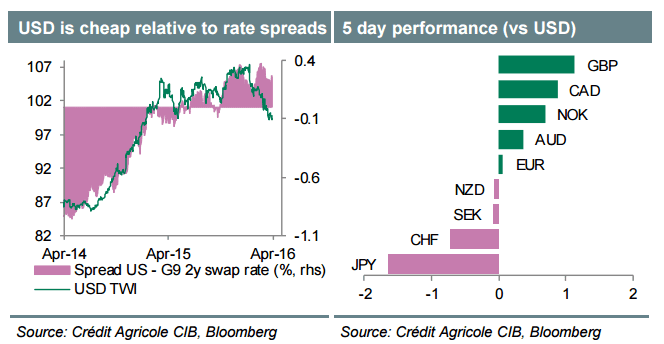Credit Agricole: Japanese Yen Most at Risk of Looming US Dollar Rebound
- Written by: Gary Howes
-
Content provided by eFXNews.
Valentin Marinov, Manuel Oliveri and Jennifer Hau at Credit Agricole say they believe the market will start focussing on policy divergence going forward once more, and the dollar will be a beneficiary:
The policy divergence theme that has driven the FX markets for the last two years came to an abrupt end at the start of this year when a combination of soaring global uncertainty and weaker US data forced the Fed to adopt a more dovish stance, and sent the USD tumbling.
At the same time, the likes of the ECB and the BoJ have seemingly acknowledged the limitations of their negative rates policy, and that helped propel EUR and JPY higher.
We think that investors will revisit the topic of policy divergence ahead of the April FOMC meeting.
Despite recently disappointing activity data, we expect the policy statement to present a more balanced outlook for the economy and inflation than in March, supported by the recent recovery in commodity prices and the improvement in global financial conditions.
To the extent that this is seen as a step away from the Fed's overly cautious stance at the start of the year, it can set the stage for a cautious USD rebound especially against currencies where we believe more monetary easing is only a matter of time.

One such currency is the JPY, which has already lost some ground on the back of recovering market risk sentiment and growing market expectations of more BoJ easing.
Going into the policy meeting on 28 April, we expect that the bank will announce aggressive unconventional measures including direct stock market purchases.
While not directly targeting the JPY, the measures should encourage renewed inflows into Japan's stock market accompanied by short-JPY hedges.
In addition, we expect the BoJ's QE3 to spur further portfolio outflows with domestic investors still underweight on FX assets following the latest JPY-appreciation.
We maintain a fairly constructive outlook for USD/JPY over the longer-term. We also think that other 'divergence' trades could be attractive as well in the near-term.
In particular we believe that a bearish JPY view could also be expressed against currencies with central banks that have reached the limits of their easing programmes, like SEK and EUR.
